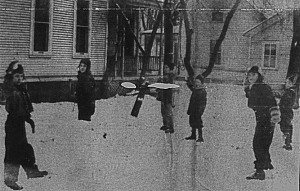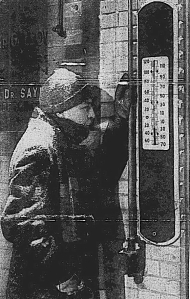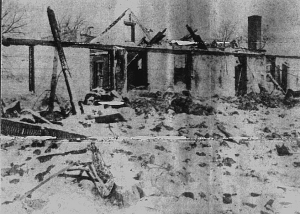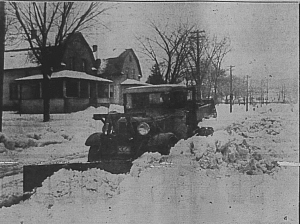Eighty years ago, northern Illinois experienced a period of bitter winter weather. For about a month, from January 22 until the end of February 1936, Lake County experienced heavy snow fall, freezing temperatures, and terrible winds. During this time the country was also in the grips of the Great Depression. Funds for equipment to manage these conditions were hard to come by. For most of this time, people in our region had to do what they could to get through difficult times.
1936 got off to a rough start in Lake County, as it was hit with a tremendous amount of snowfall, quickly followed by what seemed like an endless plunge in temperature. In January a farm in Mundelein recorded a temperature of 32 degrees below zero. Records from the time indicated that this was the longest stretch of cold that Lake County had gone through. One of the main issues with the snow was that there was nothing that could be done with it. The state had plows that would go through and clear the roads. Usually this worked well enough, but with the strong winds, snow would soon drift right over the roads. Even when the roads could be cleared, it would only be enough for a single lane of traffic. What this caused was a deadlock in traffic as automobiles, and even trucks, had a hard time moving in these conditions. It also isolated many people who lived on the outskirts of towns. Much of everyday life seemed to come to a standstill, as people stayed inside as much as they could.

The transporting of goods in and out of Libertyville became sporadic as well. Many companies would not deliver the items until the roads were clear for fear of not being able to deliver or of losing the merchandise. Trains were also affected as the combination of snow, ice, and drifts made tracks unsafe. Milk deliveries, which usually ran by truck or train, were also impacted. Some dairy farmers were able to deliver milk by sleigh. However, even that didn’t always work when the drifts became too high for even the horses to get through.

Libertyville did not have a plow of its own to use. The village budget, which allocated taxes to specific purposes, covered road repairs and construction but not snow removal. The village trustees were able to hire some people to shovel snow around the business district.

Schools across the area were often closed. When they weren’t, attendance was sparse if the weather was bad. During one snowfall, a school in Round Lake closed early. Taking 13 of the children home, the bus driver noticed that the road conditions were getting worse. He turned around and headed back to the school to avoid having the kids stuck on a cold bus. The students then spent the night at school; community members, including two of the school’s trustees, braved the elements to get food and blankets to the children.

The weather caused one fatality in Libertyville. On February 8, James Tyrrell, a barber from Waukegan, was in Libertyville with some friends. While driving home around midnight, their car became stuck in a snow drift. They hired a taxi, which proceeded to get stuck in a drift on Milwaukee Avenue. Another vehicle was stranded nearby and everyone decided to walk together back to town and get help for snowbound vehicles. After a bit, Tyrrell said he was too cold to keep going. The driver of the taxi cab gave Tyrrell the keys to the cab and told him to go back to the cab and try and stay warm. About 20 minutes later, the group got to town and sent the police back for Tyrrell, but he was nowhere to be found. All day Sunday, members of the Libertyville fire and police departments and some citizens searched for Tyrrell, but without success. The next day, Monday, February 10, Tyrrell was found frozen to death on the porch of an uninhabited house. Someone found him while shoveling the walk in front of the house, despite Tyrell being almost completely buried in snow.

Toward the end of February, the state was alerted to Libertyville’s plight and freed up some money from a gas refund tax so that the village could buy a plow. This new piece of equipment meant the village wouldn’t be caught unprepared again. But on February 22, Lake County had a massive thaw as a warm front came into the area. The snow and cold seemed to leave as quickly as it came. In less than three days, the snow that had tormented the people of Libertyville was gone. Happily, despite the speed of the warmup, the area really didn’t suffer from flooding. It seemed that Mother Nature was willing to give the area a break.
Sources
“15 Above Promised Today.” Chicago Daily Tribune. January 24, 1936, p. 1.
“Coal Dealers Tell Troubles of Cold Snap.” Libertyville Independent Register. January 30, 1936, p. 1 & 8.
“Cold Handicaps Fighting Store Fire.” Libertyville Independent Register. January 23, 1936, p. 1.
“County Battles Snow and Cold During Week.” Libertyville Independent Register. February 20, 1936, p. 1.
“Deep Snow.” Libertyville Independent Register. February 6, 1936, p. 2.
“Find Frozen Body on Porch of Adler Home.” Libertyville Independent Register. February 13, 1936, p. 1, 8 & 10.
“Severe Winds Drift Snow on County Roads.” Libertyville Independent Register. January 23, 1936, p. 1 & 10.
“Snow Blanket Is Dissipated in Record Thaw.” Libertyville Independent Register. February 27, 1936, p. 1.
“Torch Starts Fire in Dairy Early Sunday.” Libertyville Independent Register. February 6, 1936, p. 4.
“Village Buys Snow Plow on Gas Tax Fund.” Libertyville Independent Register. February 20, 1936, p. 1.
“Village Seeks Gasoline Tax Cash for Plow.” Libertyville Independent Register. February 20, 1936, p. 3.
“Weather Man Has a Heart Cold Lets Up.” Chicago Daily Tribune. February 11, 1936, p. 1.
“Winter Holds Building Work in Icy Grasp.” Libertyville Independent Register. February 20, 1936, p. 1.
Categories: Local History
